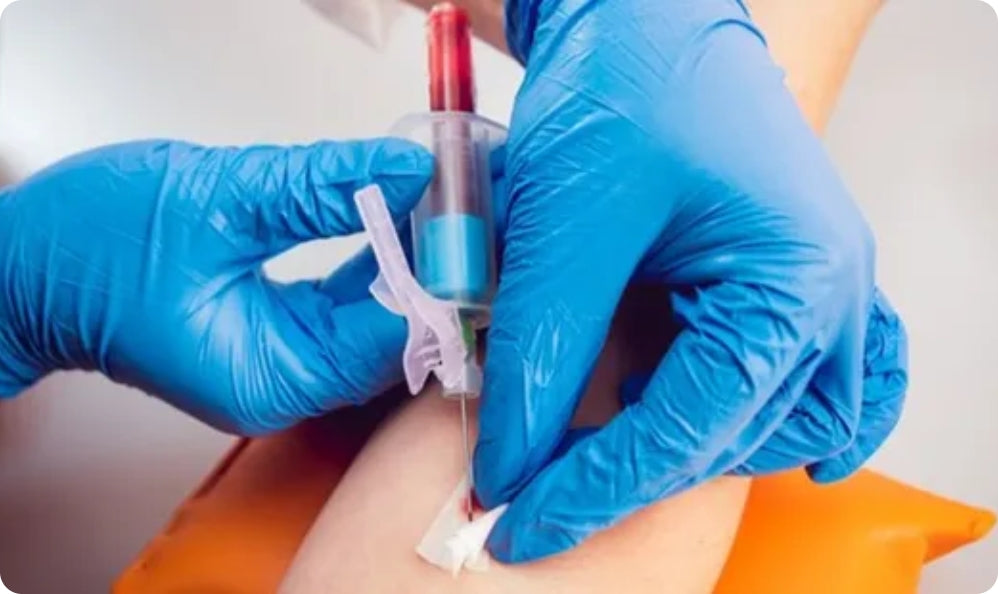
Why Getting Your Blood Done for Heart Health Is Vital
At BloodTekUK, we understand the importance of heart health, especially in the UK, where heart disease remains the leading cause of death. Many of the risk factors for cardiovascular issues—such as high cholesterol or high blood sugar—can develop without obvious symptoms. Getting your blood tested is one of the most powerful ways to assess your heart health and catch these risks early. Here’s why blood tests are crucial in preventing heart disease and keeping your heart healthy.
Early Detection: Uncover Hidden Heart Risks
Heart disease is often called the “silent killer” because many of its risk factors, such as high cholesterol and high blood pressure, can be present without any symptoms. In fact, about 7.6 million people in the UK are living with heart and circulatory diseases, and many may not even be aware of the risks. A simple blood test is a quick and effective way to uncover these hidden risks and take steps to protect your heart.
The NHS recommends regular blood tests to monitor cholesterol levels and blood sugar, as these are key indicators of heart disease, stroke, and other cardiovascular conditions. By identifying these issues early, you can make timely lifestyle changes or start treatment that can prevent major heart problems down the road.
Preventative Health: Protecting Your Heart with Early Detection
Getting your blood done is a proactive way to protect your heart and overall health. A blood test measures key markers, such as LDL (bad cholesterol), HDL (good cholesterol), triglycerides, and blood sugar levels, which are all crucial for assessing your risk of heart disease. By identifying high cholesterol or elevated blood sugar early, you can take action to reduce your risk—whether through diet changes, exercise, or medication.
For example, research shows that lowering LDL cholesterol significantly reduces the risk of heart disease and stroke. Early intervention can add healthy years to your life, reducing the risk of major health problems and ensuring you stay active and healthy for longer.
Widespread Conditions in the UK: The Importance of Regular Heart Health Monitoring
Heart disease remains a significant public health concern in the UK, with around 170,000 deaths each year attributed to cardiovascular diseases. Many of these deaths could be prevented with regular health checks. Blood tests for cholesterol and blood sugar are vital for anyone over the age of 40, as these conditions often develop without symptoms. Even if you feel perfectly healthy, getting your blood tested can uncover underlying issues before they cause serious harm.
By making blood tests a part of your regular health routine, you can take control of your heart health and monitor important risk factors that are often undetected until it’s too late.
Common Deficiencies and Risk Factors Linked to Heart Health
Blood tests don’t just assess cholesterol and blood sugar—they can also uncover potential deficiencies or imbalances that may contribute to heart disease. For example, low levels of vitamin D are associated with an increased risk of heart disease, and many people in the UK are deficient, especially during the winter months. Blood tests can identify these deficiencies, allowing you to take corrective measures, such as supplementing or adjusting your diet, to protect your heart health.
A Simple Step for Long-term Heart Health
Taking charge of your heart health doesn’t have to be complicated. A simple blood test can provide you with crucial insights into your cardiovascular risk factors. At BloodTekUK, we make it easy to get your heart health tested and take steps to ensure a healthier future.
Take the First Step Towards a Healthy Heart Today
Are you ready to take control of your heart health? Book your blood test with BloodTekUK today and get the insights you need to protect your heart. Whether you visit one of our clinics or use our At-Home Blood Testing Kit, we’ve made it easier than ever to stay on top of your heart health. Don’t wait for symptoms—get your blood done and make proactive heart care a part of your routine.
Sources:
- NHS on High Cholesterol: https://www.nhs.uk/conditions/high-cholesterol/
- Heart UK on Cholesterol: https://heartuk.org.uk/
- GOV.UK on Vitamin D Deficiency: https://www.gov.uk/government/news/new-review-launched-into-vitamin-d-intake-to-help-tackle-health-disparities // https://rightdecisions.scot.nhs.uk/media/ipnhstkb/vitamin-d-prevention-and-treatment-of-deficiency.pdf
- NICE on What is the impact of CVD? https://cks.nice.org.uk/topics/cvd-risk-assessment-management/background-information/burden-of-cvd/#:~:text=for%20CVD%20prevention-,What%20is%20the%20impact%20of%20CVD?,CVD%20and%20all%2Dcause%20mortality
- Mayo Clinic on Cholesterol test: https://www.mayoclinic.org/tests-procedures/cholesterol-test/about/pac-20384601
- British Heart Foundation on Facts and figures: https://www.bhf.org.uk/what-we-do/news-from-the-bhf/contact-the-press-office/facts-and-figures





